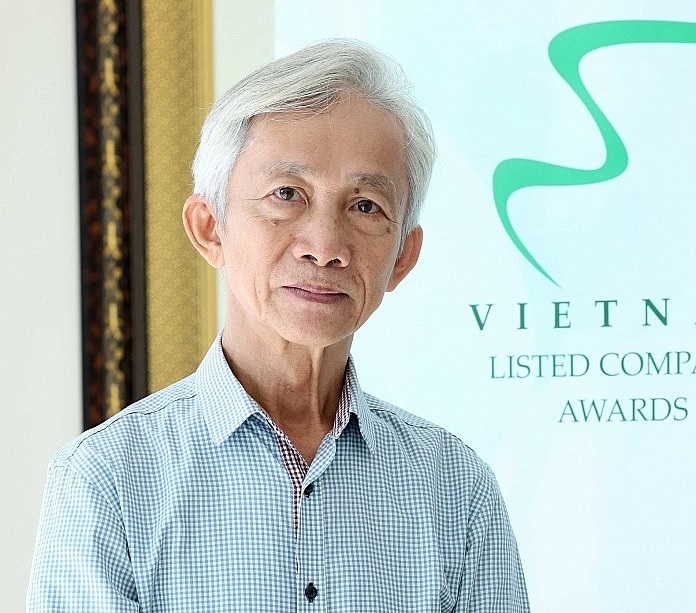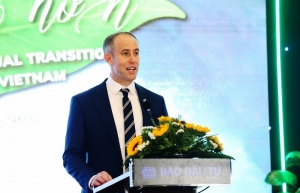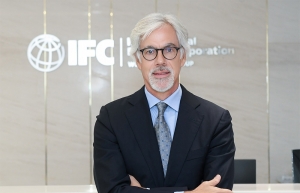Defining sustainable development in banking and finance
For example, if a production company plants a hectare of forest and highlights this in its annual or sustainability report, can we call that sustainable development? Some would argue that such an initiative supports job creation and contributes to the journey towards net-zero, thereby qualifying as sustainable development.
 |
| Tran Ngoc Tho Professor at Ho Chi Minh City University of Economics, and member of the 2024 Vietnam Listed Companies Awards Council |
But what about a bank or a securities company? While it may not plant forests, it might invest in advanced technology to ensure data security, thereby protecting thousands of its customers. Could this also be considered sustainable development?
According to broad criteria of sustainable development, financial institutions often struggle to gain recognition in this area. Awards frequently focus on manufacturing firms, which are certainly deserving. However, excluding banks, securities firms, and investment funds from sustainability awards raises the question: are we overlooking other worthy contributors?
A different challenge arises when setting criteria for sustainable finance. If we apply general, so-called international standards to financial institutions, does it make sense to award, for example, an insurance company solely on the basis of its greenhouse gas reduction investments?
Consider an insurance company that invests $40 million in emissions reduction, while a bank might invest 10 times that amount - $400 million - to exceed Basel III capital adequacy standards. Would the bank's commitment to resilience not also qualify as sustainable development?
In the finance sector, we would recognise such banks as sustainable. Why? Because, during economic shocks - whether due to a financial crisis or an environmental disaster - the strength of these banks’ capital buffers can protect depositors and maintain credit flow in the economy. However, under general sustainability criteria, these “safe and sound” banks often fail to qualify for a sustainable label.
Should we then seek tailored criteria to recognise sustainable development in financial institutions? If so, the next question is whether we should categorise financial institutions into banks and non-banks (such as securities firms, insurers, and investment funds), given their fundamentally different risk profiles. Banks operate with significant financial leverage (deposit liabilities), often many times higher than that of non-banks, making a one-size-fits-all framework unsuitable.
A potential solution could be to split awards into financial and non-financial sectors. However, identifying sustainable development criteria for finance - and further distinguishing between banks and non-banks - is no simple task. To my knowledge, no global framework exists for sustainable development specific to financial services. I have yet to see an internationally accepted sustainability framework designed specifically for the financial sector.
In reviewing the annual reports of several financial institutions, I have observed a trend towards sustainability initiatives - such as forest planting and encouraging employees to use electric vehicles to reduce emissions. But does this qualify them as sustainable? Are we guiding them in the right direction?
This presents a challenge for the 2024 Vietnam Listed Companies Awards Organising Committee of the Sustainable Business Awards, especially as more financial institutions turn to sustainability reporting.
| 44 listed companies in Vietnam excelling in information transparency for 2024 will be honoured at the 17th annual Vietnam Listed Companies Awards (VLCA) ceremony, set to take place at the Merperle Dalat Hotel. The VLCA, an extension of the Vietnam Annual Report Awards, is co-hosted by the Ho Chi Minh City Stock Exchange, Hanoi Stock Exchange, and VIR, with exclusive sponsorship from Dragon Capital. Supported by professional partners like ACCA, VIOD, IFC, and leading audit firms PwC, Deloitte, KPMG, and EY, along with information from the State Securities Commission and both stock exchanges, VLCA 2024 results affirm the evaluation's accuracy and objectivity. Now in its 17th year, VLCA continues to support Vietnam’s stock market and listed company community. |
*Tran Ngoc Tho, Professor at Ho Chi Minh City University of Economics,
and member of the 2024 Vietnam Listed Companies Awards Council.
 | VIR sustainable development conference opens in Hanoi VIR’s annual sustainable development conference, themed “Taking the Lead in Dual Transition for a Greener Vietnam,” opened at the Pullman Hanoi Hotel on November 12. The event brings together key stakeholders to explore innovative solutions for achieving Vietnam's dual transition of green and digital transformation. |
 | Takeda honoured for contributions to Vietnam's sustainable development With over a decade of groundbreaking innovative solutions in Vietnam's pharmaceutical sector, Takeda has been recognised for its contribution to sustainable development. |
 | New Zealand shares sustainable development experience with Vietnam With its commitment to environmental preservation reflected in both policy and practice, New Zealand hopes its experiences can provide guidance for Vietnam's shift to a greener economy. |
 | Banking on banks to finance the green transition Vietnam’s green goals require huge sums in order for them to succeed. Thomas Jacobs, country manager for Vietnam, Cambodia, and Laos at the International Finance Corporation, looks at capacity-building measures and the hurdles that must be overcome. |
What the stars mean:
★ Poor ★ ★ Promising ★★★ Good ★★★★ Very good ★★★★★ Exceptional
Related Contents
Latest News
More News
- Vietnam shifts into new real estate cycle (February 26, 2026 | 08:00)
- Citi report finds global trade transformed by tariffs and AI (February 25, 2026 | 10:49)
- SK Innovation-led consortium wins $2.3 billion LNG project in Nghe An (February 25, 2026 | 07:56)
- South Korean VC completes buyout of Chicken Plus Vietnam (February 25, 2026 | 07:55)
- THACO opens $70 million manufacturing complex in Danang (February 25, 2026 | 07:54)
- Vietnam’s new construction regulations shift accountability in real estate (February 25, 2026 | 07:51)
- Masan Consumer names new deputy CEO to drive foods and beverages growth (February 23, 2026 | 20:52)
- E-vehicle infrastructure financing for high growth (February 20, 2026 | 15:09)
- Myriad risks ahead, but ones Vietnam can confront (February 20, 2026 | 15:02)
- Economic factors and themes to be mindful of (February 20, 2026 | 14:55)

 Tag:
Tag:
















 Mobile Version
Mobile Version